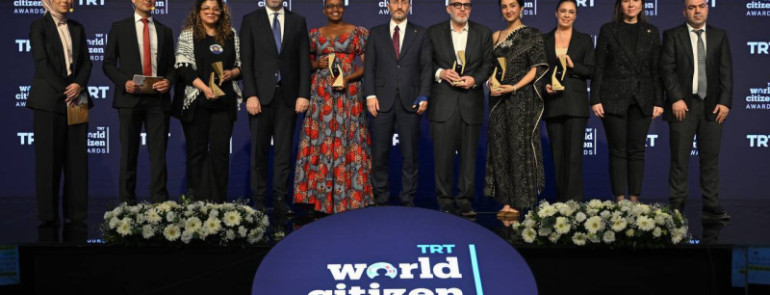Nelly Cheboi Kosi’s name has become synonymous with defying limitations and forging pathways to educational equity in Africa. Her recent recognition at the TRT World Citizen Awards, where she was bestowed with the Educator Award, is not merely an acknowledgment of her achievements; it’s a celebration of an unwavering spirit that dared to bridge the digital divide with ingenuity and recycled dreams. This is a story that transcends borders, inspiring not just educators and students, but anyone who believes that even the most audacious goals can be achieved with a determined heart and a resourceful mind.

Kosi’s journey began in Kenya. Witnessing firsthand the educational disparities plaguing her community, a fire ignited within her. Schools lacked the necessary technology, and students were often left behind in a world increasingly driven by digital literacy. Instead of succumbing to despair, Kosi chose to be an architect of change. Driven by a resolute belief in the transformative power of education, she embarked on a mission to equip African youth with the tools they needed to compete in a globalized, digital world.
This mission led to the birth of TechLit Africa, a revolutionary organization that challenged the traditional mold of education. Understanding the limitations of conventional computer labs, TechLit adopted a mobile-first approach. They recognized the ubiquitous presence of mobile phones in many African communities and leveraged this ubiquity to deliver interactive and engaging educational content. This ingenious move ensured inclusivity, reaching students in remote villages and urban townships alike.

TechLit Africa’s curriculum goes beyond teaching basic computer skills. It equips students with a powerful arsenal of 21st-century skills, including coding, critical thinking, and problem-solving. These skills are vital for success not just in academic pursuits but also in navigating a dynamic job market. Students who once struggled to access basic resources are now empowered to build websites, develop apps, and potentially even create their own businesses. This transformation underscores the organization’s core philosophy – education is not a passive process of rote memorization; it’s about nurturing creative thinkers, innovators, and problem solvers who can actively contribute to a brighter future.
But Kosi’s vision doesn’t stop at mere access to technology. TechLit fosters a culture of innovation and entrepreneurship. Their programs ignite a spark in students, encouraging them to think critically about the challenges faced by their communities and identify technology-driven solutions. This curriculum empowers the next generation of African leaders to become not just consumers of technology, but active shapers of their digital destiny.

The impact of TechLit Africa’s work has been profound. They have reached thousands of students, igniting a passion for learning and opening doors to previously unimaginable possibilities. Students who were once limited by their circumstances are now equipped with the knowledge and skills to pursue their dreams, contributing to the social and economic development of their communities.
Kosi’s recognition at the TRT World Citizen Awards is a powerful symbol of the transformative power of a dedicated educator. She serves as an inspiration not just to aspiring educators but to anyone who dares to dream big and tackle seemingly insurmountable challenges. Her story reminds us that even with limited resources, immense change can be achieved through sheer determination, innovative thinking, and a deep commitment to empowering future generations.
Partnerships for Progress: Building an Equitable Digital Future
However, Kosi’s work also shines a light on the ongoing struggle for educational equity in Africa. Millions of children still lack access to quality education, and the digital divide remains a significant barrier. This reality underscores the need for continued support and collaboration from various stakeholders.
The fight for educational equity in Africa requires a multi-pronged approach, one that fosters collaboration between governments, educational institutions, the private sector, and social entrepreneurs like Nelly Cheboi Kosi. Here are some key areas where partnerships can create a lasting impact:
Empowering Educators: Effective teachers are the anchor of a strong education system. Investing in teacher training programs that equip educators with the skills to integrate technology effectively into their curriculum is crucial. Programs that provide ongoing support and professional development opportunities would further enhance the impact of educators like Kosi and help them reach a wider audience.
Bridging the Digital Divide: Providing affordable devices and reliable internet access remains a critical challenge. Government initiatives, private sector partnerships, and innovative solutions like TechLit’s mobile-first approach can all play a role in closing this gap. Additionally, exploring alternative solutions like solar-powered devices can enhance accessibility in remote areas.
Encouraging Innovation and Collaboration: TechLit Africa’s success demonstrates the transformative power of innovative approaches to education. Creating platforms for knowledge sharing and fostering collaboration between social entrepreneurs, educators, and policymakers is vital for identifying context-specific solutions and accelerating positive change.

